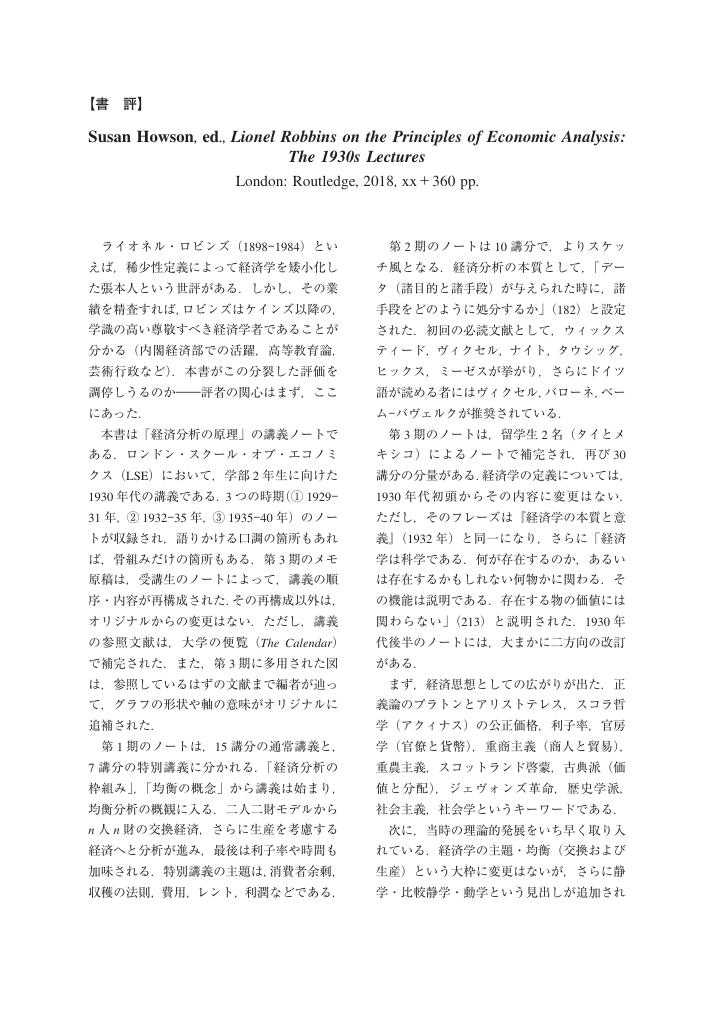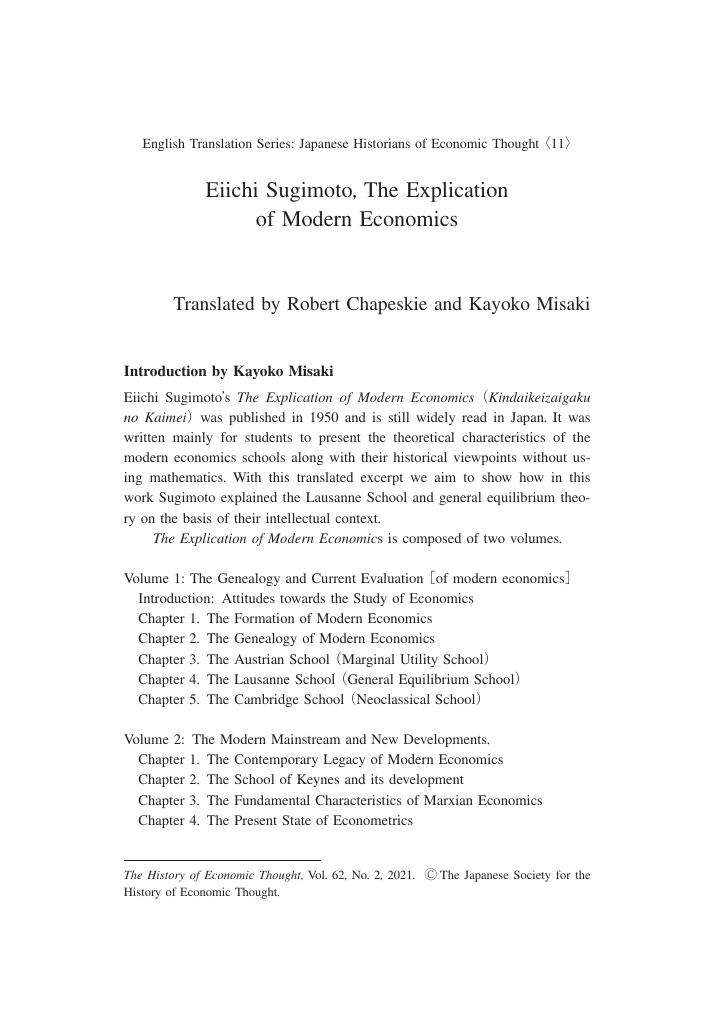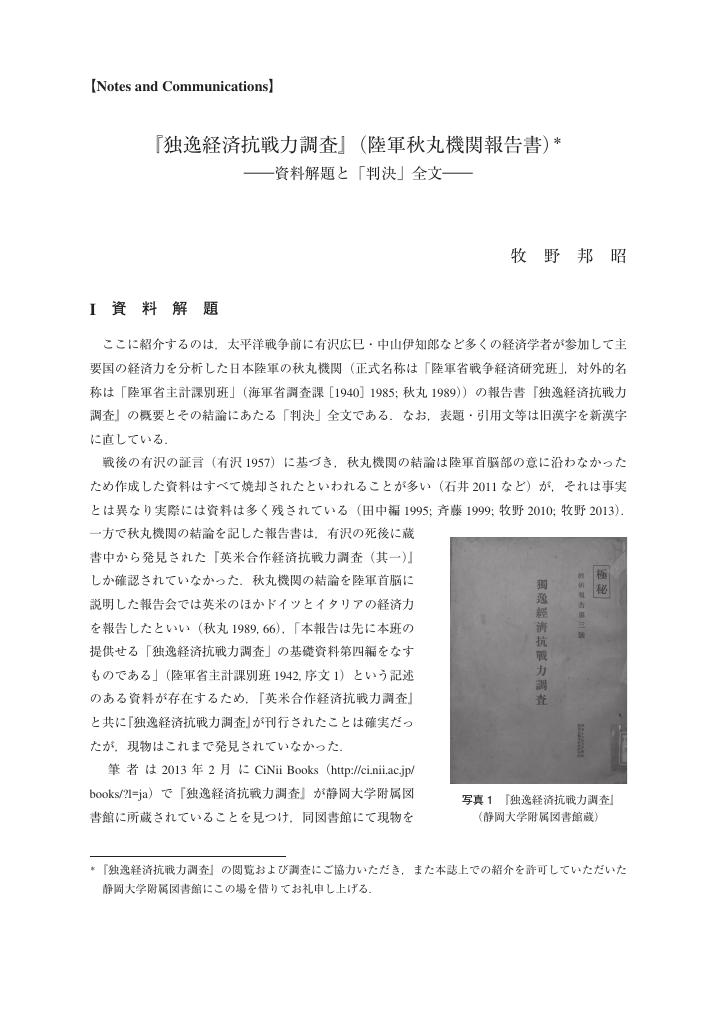3 0 0 0 OA 塩野谷祐一の経済倫理学 卓越主義の構想を中心に
- 著者
- 斉藤 尚
- 出版者
- 経済学史学会
- 雑誌
- 経済学史研究 (ISSN:18803164)
- 巻号頁・発行日
- vol.61, no.1, pp.45-65, 2019 (Released:2019-10-01)
Abstract: This article aims to demonstrate Yuichi Shionoya’s theory of economic ethics by classifying his study into early, middle, and later stages and focusing on his conception of perfectionism. His theory is composed of ethics and economics. In early and later stages, Shionoya proposes his notion of ethics as one category of liberal perfectionism by demonstrating the relationship between the concepts of justice, goodness, and virtue. Part of its originality is that it is defined as being compatible with the pursuit of common good, which is the main purpose of welfare economics. Moreover, he proposes three kinds of economics: economic sociology, economic statics, and economic dynamics in the middle and later stages. He argues that a society in which liberal perfectionism prevails can be realized by the elitist method that he demonstrates in economic sociology. Thus, Shionoya attempts to construct his economic ethics as “universal social science” by integrating the ideas of political philosophy and welfare economics and showing consistency in his entire study. This article questions the consistency of Shionoya’s theory of economic ethics. The rest of this article is organized as follows. First, we classify Shionoya’s study and show that his main purpose is to construct an alternative theory by criticizing neoclassical economics. Second, we clarify his view of perfectionism by showing his ethical system. We then outline his theory of economic ethics by analyzing his economics and clarifying his method of institutional reform. Finally, we express doubt as to whether reform can lead to his concept of an ideal society. JEL classification numbers: B31, O31.
3 0 0 0 OA バーク経済思想研究の最前線 「バークとスミス」はどのように論じられてきたのか
- 著者
- 中澤 信彦
- 出版者
- 経済学史学会
- 雑誌
- 経済学史研究 (ISSN:18803164)
- 巻号頁・発行日
- vol.60, no.2, pp.102-105, 2019 (Released:2019-09-04)
3 0 0 0 OA 石橋湛山の経済理論 古典派的側面を中心に
- 著者
- 布施 豪嗣
- 出版者
- 経済学史学会
- 雑誌
- 経済学史研究 (ISSN:18803164)
- 巻号頁・発行日
- vol.60, no.2, pp.1-19, 2019 (Released:2019-09-04)
Abstract: Although the relationship between liberalism and his political thought has been emphasized, the classical aspect of his economic theories has been underestimated. This has, in my view, several reasons: To be sure, Ishibashi was one of those who had introduced Keynesian economics and his idea of positive fiscal policy. At the same tine, Ishibashi also admitted the rigidity of the market system. But this aspect of his economics did not prevent him to be committed to the classical economic theories, based on free market. It is characteristic of Ishibashi that these aspects existed together in theory and in practice. Based on this understanding, this paper attempts to reveal his optimism about price adjustment. This, in my understanding, led to his basic optimism about inflation. Thus, the study contributes to the better understanding of Ishibashi’s economic thought in particular and also to the better understanding of the many-layered disputes in his age in general. JEL classification number: B31.
3 0 0 0 OA アダム・スミス研究の動向 過去10年における内外の『国富論』研究を中心に
- 著者
- 渡辺 恵一
- 出版者
- 経済学史学会
- 雑誌
- 経済学史研究 (ISSN:18803164)
- 巻号頁・発行日
- vol.53, no.1, pp.100-118, 2011 (Released:2019-08-21)
This paper aims to review the scholarship on Adam Smithʼs The Wealth of Nations (WN) in the past decade. The publication of The Glasgow Edition of the Works and Correspondence of Adam Smith (1976―1987) led to the so-called “Adam Smith Renaissance” that has encouraged many scholars from different disciplines to con-duct interdisciplinary or multidisciplinary stud-ies on Smith. In addition to the studies on Scot-tish Enlightenment, the establishment of the In-ternational Adam Smith Society (IASS) in 1995 and the publication of the Adam Smith Review (ASR) in association with the IASS since 2004 further promoted interdisciplinary studies on Smith. Thus, the interdisciplinary wave of interest in Smithʼs moral philosophy is an outstanding feature of the latest scholarship on Smith. How-ever, as the interdisciplinary studies on Smith have advanced increasingly, there has been a definite waning of interest in his economics con-cerning WN. This phenomenon is indicated straightforwardly in Den Uyl (2008, 4) who mentions that “We can no longer say that WN is somehow the ʻessentialʼ Smith” and in Forman-Barzilai (2008, 219) who affirms that “Smithʼs political economy itself was not the centre on his thought, but rather its place in a lager project of moral philosophy.” Part I of this paper is a prologue to the man-ner in which the WN was studied in the past dec-ade. Part II discusses two excellent foreign works, Fleischackerʼs On Adam Smithʼs Wealth of Nations (2004) and Aspromourgosʼ The Sci-ence of Wealth (2009). These two books sharply contrast with each other, because the former has a philosophical approach to WN, while the latter adopts an orthodox style used by economic his-torians. Part III considers the scholarship on the WN in Japan. Inamuraʼs Reconsideration of the system of The Wealth of Nations (2003), Ta-jimaʼs Adam Smithʼs Institutional Economics (2003), and Takemotoʼs Across The Wealth of Nations (2005) will be mainly reviewed in this paper. In part III, I aim to ascertain the ortho-doxy of our scholarship on WN and its transfigu-ration in comparison with the scholarship abroad. Part IV, the epilogue, briefly surveys the origin of WN (Smithʼs political economy) in or-der to understand the nature of modern econom-ics. JEL classification number: B12, B31, A12.
2 0 0 0 OA アメリカにおけるハイエクの『隷属への道』 思想の受容・普及プロセスからのアプローチ
- 著者
- 吉野 裕介
- 出版者
- 経済学史学会
- 雑誌
- 経済学史研究 (ISSN:18803164)
- 巻号頁・発行日
- vol.55, no.1, pp.36-52, 2013 (Released:2019-08-23)
In this paper, we consider F. A. Hayekʼs The Road to Serfdom and the diffusion of the bookʼs ideas in the United States. The contributions of Fritz Machlup in the bookʼs development and acceptance are given special attention. Although The Road to Serfdom is Hayekʼs best-selling book, many Hayekian scholars choose to focus on his other work. Here, we ana-lyze the ideas of The Road to Serfdom in detail, so that we can find new aspects of Hayekʼs early thought and determine why the book has be-come so influential. Hayek wrote The Road to Serfdom for the intelligentsia of England, but its impact was felt most strongly by the general populous of the United States. Hayek maintained the core ideas of the book, the rule of law and meaning of com-petition, in his later work, such as The Constitu-tion of Liberty and Law, Legislation, and Liber-ty. Hayek and Machlup were in contact with each other their entire lives. The Hoover Institu-tion, a think tank at Stanford University, houses large amounts of correspondence that illustrate the friendship between the two men. Some mate-rial shows Machlup putting great efforts toward publishing The Road to Serfdom in the United States. Eventually, Aaron Director and Frank Knight helped Hayek publish the book with The University of Chicago Press. The condensed, il-lustrated version of The Road to Serfdom played an important role in diffusing its ideas to a gen-eral readership in the United States. The publication of The Road to Serfdom was the beginning of a long relationship with the University of Chicago for Hayek, and the suc-cess of the book enabled him to immigrate to the United States. Indeed, we argue that The Road to Serfdom was the prototype for his later books, The Constitution of Liberty and Law, Legisla-tion, and Liberty. However, we believe there is a disparity between how Hayek viewed his ideas and the way people interpreted his work. One of the primary reasons for this was the difference in the usage of the word “liberal” in England and the United States. JEL classification numbers: B 25, B 31.
- 著者
- Kayoko Misaki
- 出版者
- The Japanease Society for the History of Economic Thought
- 雑誌
- 経済学史研究 (ISSN:18803164)
- 巻号頁・発行日
- vol.64, no.1, pp.58-61, 2022-07-25 (Released:2023-02-01)
2 0 0 0 OA 藤田菜々子『福祉世界―福祉国家は越えられるか』中央公論新社,2017 年,241 頁
- 著者
- 平方 裕久
- 出版者
- 経済学史学会
- 雑誌
- 経済学史研究 (ISSN:18803164)
- 巻号頁・発行日
- vol.61, no.1, pp.137-138, 2019 (Released:2019-10-14)
2 0 0 0 OA ジェイムズ・ステュアートの銀行論
- 著者
- 古谷 豊
- 出版者
- The Japanease Society for the History of Economic Thought
- 雑誌
- 経済学史研究 (ISSN:18803164)
- 巻号頁・発行日
- vol.49, no.2, pp.1-17, 2007-12-25 (Released:2010-08-05)
- 参考文献数
- 17
Much ink has been spent over the last few decades on James Steuart's theory on banks. Critics are united in the view that his ‘banks upon mortgage’ is an idea of central importance in Steuart's theory on banks. They propose that insofar as Steuart argued against bank lending upon mercantile credit because it is precarious, his concept of bank credit upon mortgage must be regarded as a representative pillar of his theory. This understanding has also supported the claim that Steuart's theory on banks is outmoded in the sense that it gives little or no allowance for banks providing mercantile credit.If we consider Steuart's theory on banks within his whole chain of arguments, that interpretation is open to question. Steuart's principles of political economy, including his theory on banks, are built within a historical structure. He denies bank credit based on mercantile credit, only when the society is in the infancy of trade. In his theory on banks, he posited three classifications: ‘banks upon private credit’ (i.e. upon mortgage), ‘banks upon mercantile credit, ’ and ‘banks upon public credit, ’ each with a different role in the development of the economy.Considered in this perspective, the significance of Steuart's theory on banks lies in that the principles on which bank credit is based extend according to the development of trade and industry and to the policy of statesmen. His theory of banks must be regarded as a part of his arguments on providing money in proportion to the circulation.
2 0 0 0 OA Marx versus Walras on Labour Exchange
- 著者
- 岡田 元浩
- 出版者
- The Japanease Society for the History of Economic Thought
- 雑誌
- 経済学史研究 (ISSN:18803164)
- 巻号頁・発行日
- vol.52, no.2, pp.46-62, 2011 (Released:2019-08-20)
- 被引用文献数
- 2 2
Abstract: This paper compares Léon Walras’s and Marx’s thoughts on labour exchange, thereby illuminating the latter’s perspective that can lead to a forceful counterargument to the neoclassical principle of labour exchange, for which the former affords a foundation. Both Walras and Marx distinguish between labour ability as a factor of production and labour as its service, but exhibit a striking contrast in their explanations of the distinction. Walras’s distinction between ‘personal faculties’ and labour never attempts to reveal the peculiarities of the relationship they share. Walras essentially equates the relationship between the two with that between non-human factors and their respective services by stripping the former of human elements. This not only allows labour exchange to be incorporated into Walras’s general equilibrium system but also provides the groundwork for its neoclassical principle, which, on the basis of marginal theory, assumes work conditions to be determinable through the stylised market adjustment of the demand and supply of labour on each entrepreneur’s and worker’s maximisation behaviour. In contrast, especially in his pre-Capital writings, Marx underlines the worker’s subjectivity in deciding her labour performance. This implies that the type and intensity of time-unit labour varies depending on the worker’s will and the constraints upon it. Accentuating the particular characteristics of the relationship between labour power and labour in this way, Marx’s arguments lead to the invalidation of the neoclassical principle of labour exchange and rationalise the intervention of socio-political factors represented by the labour-capital class struggle in the determination of work conditions. Thus, this study focuses on the potential of Marx’s labour power-labour distinction independent of his exploitation theory-the basis of a weighty refutation of the neoclassical system. JEL classification numbers: B 13, B 14.
2 0 0 0 OA Bert Mosselmans, Marginalism
- 著者
- Kayoko Misaki
- 出版者
- The Japanease Society for the History of Economic Thought
- 雑誌
- 経済学史研究 (ISSN:18803164)
- 巻号頁・発行日
- vol.63, no.2, pp.65-66, 2022-01-25 (Released:2022-11-04)
- 著者
- 小峯 敦
- 出版者
- 経済学史学会
- 雑誌
- 経済学史研究 (ISSN:18803164)
- 巻号頁・発行日
- vol.63, no.1, pp.64-65, 2021 (Released:2022-01-09)
2 0 0 0 OA 板倉孝信『ポスト財政=軍事国家としての近代英国』 晃洋書房,2020 年
- 著者
- 大倉 正雄
- 出版者
- 経済学史学会
- 雑誌
- 経済学史研究 (ISSN:18803164)
- 巻号頁・発行日
- vol.63, no.1, pp.66-67, 2021 (Released:2022-01-09)
- 著者
- Robert Chapeskie Shin Kubo Naoki Mastuyama
- 出版者
- The Japanease Society for the History of Economic Thought
- 雑誌
- 経済学史研究 (ISSN:18803164)
- 巻号頁・発行日
- vol.63, no.1, pp.23-58, 2021 (Released:2022-01-13)
- 著者
- Kayoko Misaki
- 出版者
- The Japanease Society for the History of Economic Thought
- 雑誌
- 経済学史研究 (ISSN:18803164)
- 巻号頁・発行日
- vol.62, no.2, pp.26-66, 2020 (Released:2021-12-02)
- 著者
- 安藤 隆穂
- 出版者
- 経済学史学会
- 雑誌
- 経済学史研究 (ISSN:18803164)
- 巻号頁・発行日
- vol.57, no.1, pp.110-111, 2015 (Released:2019-11-26)
2 0 0 0 OA 『独逸経済抗戦力調査』(陸軍秋丸機関報告書) 資料解題と「判決」全文
- 著者
- 牧野 邦昭
- 出版者
- 経済学史学会
- 雑誌
- 経済学史研究 (ISSN:18803164)
- 巻号頁・発行日
- vol.56, no.1, pp.96-102, 2014 (Released:2019-08-24)
2 0 0 0 OA 神田孝平『農商辨』における商の「利」
- 著者
- 南森 茂太
- 出版者
- The Japanease Society for the History of Economic Thought
- 雑誌
- 経済学史研究 (ISSN:18803164)
- 巻号頁・発行日
- vol.50, no.1, pp.62-78, 2008-07-31 (Released:2010-08-05)
- 参考文献数
- 41
Takahira Kanda, with his lifelong interest in economic problems, was a pioneering scholar, teacher, and translator of Western economics in Japan. His Keizai shogaku [Elementary Economics] (1867), for which he translated Western-language sources, is particularly well-known. But it is an earlier work, Noshoben [An Exact Explanation of an Agrarian Nation and a Merchant Nation], published in 1861 that is the focus of this paper. In this book, Kanda's economic thinking appears radical by the standards of the time. It has drawn the attention of economic historians for what they see as a liberal side, and its arguments have often been compared with Western economics. What scholars have tended to overlook, however, is the side of Noshoben that clearly reflects the economic thought prevailing in Japan at the time.Contrary to the current image of Noshoben, this paper attempts to demonstrate that Kanda's thought was largely based on the economic thought of the Edo era. In that book, he argued that taxes on farmers were the cause of the budget deficit and the poverty of farmers, and that those conditions invited aggression by foreign countries, which meant, he said, the necessity of reforming the existing tax system. He proposed tax reform by treating revenue from farm products as commercial profits, and he argued that promoting foreign trade would be effective to increase commercial profits. Those ideas were not new. We can find them in the work of Toshiaki Honda, for example, who wrote most of his treatises in the late 18th century. Nonetheless, Noshoben had considerable originality. For instance, while many Edo era economists regarded merchants as wily and untrustworthy, encouraging the shogunate or feudal rulers to maintain strict control over trade with foreign countries, Kanda recognized the important role merchants could play in external trade, and, consequently, in strengthening the domestic economy. His idea of imposing a tax on the profits of merchants was radical at that time.
2 0 0 0 OA マイケル・ポランニーの自由主義論 道徳的諸信念・自生的秩序・専門家主義
- 著者
- 今池 康人
- 出版者
- 経済学史学会
- 雑誌
- 経済学史研究 (ISSN:18803164)
- 巻号頁・発行日
- vol.62, no.1, pp.1-25, 2020 (Released:2020-10-16)
This paper examines Michael Polanyi’s views on liberty. Polanyi was a scholar with expertise in several fields of study. He began his academic career as a physical chemist and later became a philosopher. He then studied economics, liberalism, and philosophy. Many researchers have shown interest in his arguments on religion and knowledge. However, an inquiry into his views on liberty is seemingly lacking. Polanyi distinguished between personal (including that classified as negative) and public liberty (including that classified as positive) and believed that we should protect public liberty. His theory comprises three elements. First, Polanyi emphasized moral belief among people living in a free society. He focused on British traditions and suggested that morality is also influenced by British tradition. Second, Polanyi clarified the role played by spontaneous order in society. He placed particular emphasis on an intellectual order (law, science, and so on). In a free society, people’s actions yield better results because their behaviors are mutually adjusted as a function of the spontaneous order. The third premise in Polanyi’s theory asserted that a free society requires that its leaders be professionals, which I call “professionalism.” After writing The Logic of Liberty, Polanyi moved on to other fields of research, such as knowledge, religion, and so on. Here, it should be mentioned that all of Polanyi’s research across various fields is related to his study on liberty. JEL classification numbers: A12, B31.
2 0 0 0 OA 田村信一『ドイツ歴史学派の研究』 日本経済評論社,2018 年,viii+345 頁
- 著者
- 奥山 誠
- 出版者
- 経済学史学会
- 雑誌
- 経済学史研究 (ISSN:18803164)
- 巻号頁・発行日
- vol.60, no.2, pp.127-128, 2019 (Released:2019-10-14)
- 著者
- 竹永 進
- 出版者
- The Japanease Society for the History of Economic Thought
- 雑誌
- 経済学史研究 (ISSN:18803164)
- 巻号頁・発行日
- vol.61, no.2, pp.84-85, 2020 (Released:2020-02-29)










